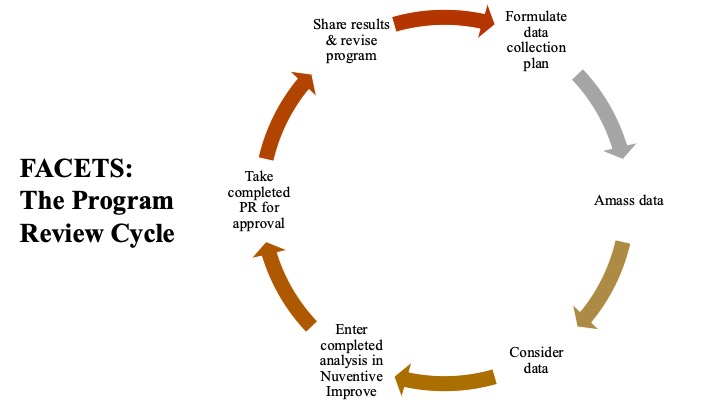
General Description
The College of the Marshall Islands’ redesigned program review process seeks to move the college through proficiency in program review to the level of sustainable, continuous quality improvement. This goal will be achieved by further integrating program review into institutional decision-making, creating space for dialogue across the institution regarding program review results and their use in the improvement of student learning and achievement, and requiring regular revisions of the program review process itself. A full description of the process follows year showing how different program groups will move through an initial two-year transition review followed by the final three-year cycle.
The Accrediting Commission for Community and Junior Colleges Standards most relevant to the program review cycle are: I.B.1, I.B.2, I.B.4, I.B.5, I.B.8, I.B.9, I.C.3, II.A.2, II.A.3, II.A.16, and II.C.2.
Groups
Instead of all program reviews across the college following the same schedule, programs will be divided into six groups, each of which will complete a different phase of the program review each term. The groups will be defined as follows:
I. Degree Programs
A.A. in Liberal Arts
A.A. in Business Studies
A.S. in Elementary Education
B.A. in Elementary Education
A.S. in Nursing
II. Student & Learning Support Services
Counseling
Health Center
Registrar
Student Engagement and Equity
Library
Academic Support Program
Nuclear Institute
Admission and Records
Residence Halls
Learning Designer
III. Non-Credit & Secondary Instructional Programs
Developmental Education
Adult Basic Education
Youth Corps
Career and Technical Education (programs not otherwise listed)
IV. Grants, Campuses, DE Centers & Other Programs
Upward Bound
NSSP
Land Grant
Arrak Campus
Jaluit Center
Ebeye Center
General Education
Grants Coordinator
Translation
Any areas not otherwise assigned
V. Certificate Programs
C.C.T. Accounting Clerkship
C.C.T. Marshallese Language Arts
C.C.T. Marshallese Social Studies
C.C.T. Marine Science
C.C.T. Teaching
C.C.T. Special Education
Advanced Specialization in Deaf Education
Advanced Specialization in Severe Disabilities
C.C.T. Public Health
C.C.T. Carpentry
Standards of Training, Certification, and Watch-keeping (STCW) Certificate
Basic Crew member Certificate
SPC Basic Fisheries Observer Certificate
Apprenticeship Certificate
VI. Administrative Units
Accounting
Budget
Procurement
Financial Aid
Physical Plant
Human Resources
Safety and Security
Institutional Research and Assessment
Information Technology
Media Center
Bookstore & Food Services
Program Review Content
Program reviews will include the following elements in Nuventive Improve:
- Alignment of department mission to college mission
- Alignment of PLOs/AUOs to ISLOs
- Stakeholder data, descriptions, and analysis of trends and gaps
- Instructional programs must include: enrollment data, completion data, and alumni employment data disaggregated for subpopulations
- Student and learning support programs must include: user data disaggregated for subpopulations
- Any other data relevant to College KPIs should be included
- Program resources and gap analysis
- Stakeholder comments and analysis
- PLO/AUO assessments, including analysis of results
- SLO assessments (instructional programs only)
- Evidence of contributions to student attainment of instructional program PLOs (Library, ASP, and Nuclear Institute) and gap analysis
- Assessment against relevant ACCJC standards (including evidence)
- Budget impact (including tuition income and expenditures), reflection, and 3-year projections with the most recent data or the last relevant data set provided as a reference
- 3-year work plan, including assigned elements of the strategic plan and remedial actions resulting from gap analyses
- Initiatives requiring one-time additional funding
- Feedback for institutional planning
- Assessment of prior work plan
Annual Department Update
Because program review will occur over a multi-year period, each department will prepare an annual department update using a template approved by IEC and the Budget Committee. Areas of the college with budgets that are not covered under program review should complete the annual department update. The template will include:
- A finalized budget for the upcoming year.
- Updates on work plan(s), including objectives met, gaps, and challenges.
- Revisions to work plan(s) with justification.
- Any revisions to initiatives with justification.
- These reports will be approved first by the IEC and second by the Budget Committee. Recommendations will be made by these committees based on the updates.

